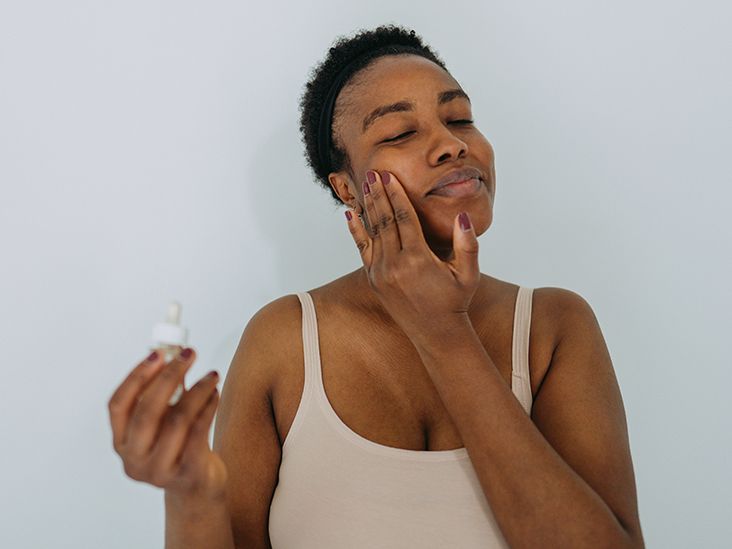At-home skin care may help keep your skin healthy. But what works best varies by skin type. A dermatologist can help you determine what works best for you.
Many of us dream of achieving flawless skin. While so-called “perfect” skin doesn’t exist, it’s likely still possible to dramatically improve the health and appearance of your skin.
Realistically, most of us have at least one or two skin concerns. Whether we’re working with hormonal breakouts, excessive oil, or fine lines, we’ve all got goals when it comes to our skin.
These expert tips help demystify your skin care so you can give your skin exactly what it needs.
Whether it’s a tried-and-true skin care regimen, how often you wash your hair, or the cosmetics you’re curious about, beauty is personal.
That’s why we rely on a diverse group of writers, educators, and other experts to share their tips on everything from how product application varies to the best sheet mask for your individual needs.
The world of skin care gets complicated pretty quickly. If you feel dizzy thinking about serums, lotions, cleansers, toners, and oils, you’ve come to the right place.
While everyone has unique needs when it comes to skin care, there are a few basic products and practices that everyone can try to improve their skin.
The first rule of good skin care?
Keep it simple.
In addition to drinking enough water and eating a balanced diet, it’s best to stick with the basics:
- mild cleanser
- moisturizer
- sunscreen
Simple skin care also means using just enough product. Using liberal amounts of products, apart from sunscreen, has no benefits. Using too many skin care products, too often, can cause issues such as rosacea and eczema flares.
Skin care 101
Aside from keeping your routine simple, experts offer a few more tips for acing your skin care routine.
- Get the order right.
- Exfoliate once per week.
- Always wear an SPF.
- Drink water, and lots of it.
- Don’t forget your neck and décolletage.
Hit all the steps
What’s the right order for your skin regimen?
Use this simple rule: Products should be applied from lightest to heaviest.
Exfoliation
Exfoliation helps slough off dead skin cells, but overexfoliation can cause your skin to react with excess oil production or breakouts. It’s best to exfoliate only once or twice per week.
Sun protection
Next: Always, always, always wear an SPF.
According to the American Academy of Dermatology Association (AADA), sun damage is one of the leading causes of:
- wrinkles
- age spots, or hyperpigmentation
- loose or saggy skin
- spider veins
- uneven complexion
- skin cancer
Hydration
Hydration is a must for healthy, glowing skin. Dehydrated skin can feel dry, itchy, and dull.
Drink liquids throughout the day, including electrolytes, to keep your hydration levels high.
Not just for your face
Your neck and décolletage, or the skin on your chest, also need some love. These oft-neglected areas are also prone to sun damage and signs of aging.
OK, so now you’ve got the essentials down. If you want to up your game, try the tips below.
Skin care 102
- Double cleanse.
- Use toner.
- Boost your vitamin C.
- Try retinol.
- Hone your moisturizing technique.
- Avoid hot water.
- Eat your skin care (but not the products!).
- Give your face a massage.
Cleansing twice
Double cleansing helps to remove debris, makeup, and oil from the day.
Using an oil-based cleanser first helps to dissolve oil-based stuff from the skin, like sunscreen, makeup, or excess sebum. And following it with a water-based cleanser helps remove water-soluble stuff, like sweat, dirt, and other types of makeup.
Get toned
Adding toner to your routine means that you’re getting another opportunity to cleanse and balance your complexion. Toners restore nutrients to the skin that cleansers might remove.
Vitamin C
Once you’re cleansed and toned, vitamin C serum is next.
According to a
It’s best to apply vitamin C during your morning routine.
Retinol
Use retinol at night. This can prevent acne and help slow the aging process. If caught early, it can also help treat actinic keratosis. However, retinol may cause irritation for some skin types and conditions. Check with your dermatologist or conduct a patch test before you give it a try.
Moisturize like a pro
Yes, there’s a right way to apply moisturizer. Massage your moisturizer into your face and neck in an upward motion, moving away from the center of your face.
Cool-water cleanse
Hot water can be too intense and cause the skin to dry out. Use lukewarm or cool water, and avoid washing your face in the shower unless you turn down the temp.
Facial massage
A face massage or face roller can help depuff your skin. A massaging tool can increase blood flow, leaving you looking more awake.
Use a cleansing balm and a washcloth to remove makeup. Experts agree that this technique is more effective than makeup wipes.
Remember to keep your makeup brushes clean. Bacteria can build up on your brushes and cause congestion and breakouts.
Even when you’re staying in for the day, you can still take good care of your skin.
Experts suggest:
- Wear an SPF: This helps protect your skin from blue light emitted from screens.
- Clean your pillowcase: You can also give silk or copper a try.
- Try back sleeping: Sleeping on your back can help minimize wrinkles.
- Actually sleep: A good night’s sleep is the key to great skin.
- Keep your space clean: Remember to clean high-touch surfaces and makeup applicators.
- Add humidity: This keeps moisture in the air and helps with dry skin.
DIY skin care
Here are a few DIY skin care recipes you may want to try at home:
Take extra care of your skin when you step outside.
- Stay armed: Always have a lip balm and an SPF handy.
- Add extra protection: Protect from pollutants and dirt particles with a moisturizer.
- Limit sun exposure: Wear a hat or stick to the shade when you can.
- Wash your mask: When you wear a face mask to block out light, keep it clean.
Many people focus on the skin on their faces, but the whole body can benefit from some extra care.
- Skin check: Pay attention to any moles and have a full body exam to detect signs of melanoma.
- Moisturize your body: Don’t forget this, especially after hot showers and baths.
- Exfoliate: Do this with a scrub once per week.
- Target stretch marks: You can do so with products that contain vitamin A, hyaluronic acid, or coconut oil.
Understanding your skin’s behavior will help you to make the right choices when it comes to what you put on it. No matter your skin type, protect your skin daily with an SPF 30 or higher.
Common skin types include:
Skin care tips for oily skin
Here are some pro tips to keep shine at bay.
- Don’t overdo it with oil-reducing face masks and other drying products.
- Exfoliate once or twice per week.
- Avoid cream moisturizer. Try a lighter gel instead.
- Use a primer or foundation with mattifying properties.
- Niacinamide serums can help reduce oil.
Skin care tips for dry skin
Try these tips to keep your skin feeling hydrated.
- Moisturize damp skin to lock in moisture.
- Avoid hot water.
- Reduce caffeine and salt. They can worsen dry skin.
- Always have a lip balm with you. Your lips will probably get dry throughout the day.
- Hydrate with a face mask once per week, followed by your moisturizer.
- Facial oil — nightly, after your moisturizer — is your best friend.
Skin care tips for combination skin
If your skin is oily and dry in different areas or at different times, you may be experiencing combination skin.
- Get familiar with your skin. Do you have an oily T-zone and dry cheeks, for instance? You may want different products for each area.
- Opt for gentle products that won’t aggravate the skin. Favor hydrating products that don’t contain alcohol.
- Exfoliate gently. While weekly exfoliation is great for oily skin, it may make dry patches feel worse. Take it easy and space exfoliation sessions farther apart if needed.
Skin care tips for normal skin
“Normal” skin is characterized by being neither particularly oily nor dry.
- Use a lotion or a cream at night rather than a gel moisturizer.
- Don’t get carried away with new skin care products. Normal skin tends to require less maintenance. Adding unnecessary steps may cause irritation.
- Remember that SPF!
Skin care tips for darker skin tones
Darker skin tones may require specific care due to increased melanin.
- Use an SPF 30 or higher: Darker skin tones with increased melanin can be prone to sun damage.
- Tackle hyperpigmentation: Try an illuminating serum or other targeted treatment.
- Treat acne as it begins: People with darker skin tones may have a higher risk of acne spots and acne scarring if acne worsens before treatment.
Skin care tips for lighter skin tones
Lighter skin tones can be extremely susceptible to the sun.
- Use an SPF 30 or higher, even when it’s cloudy.
- Watch for rosacea. This condition is common in lighter skin tones.
Signs of rosacea include:
- flushed skin
- eye irritation
- small red bumps
Skin care tips for acne
Acne-prone skin can be difficult to treat. Here are a few tips to help you stay clear.
- Know your type: Salicylic acid is good for whiteheads and blackheads, while benzoyl peroxide is better for deeper acne cysts.
- Stay moisturized: While you may want to dry your skin so that it’s less oily, this will only result in your skin producing more oil to compensate.
- Really try not to pick! This can lead to permanent scarring.
- Sandwich your products: Use any acne-targeted treatment after your toner and before your moisturizer.
- Add retinol: Using retinol in the evening can target both acne and aging.
Speak with your doctor about persistent adult acne to find out about prescription treatment options.
Guess what? Skin is skin! No matter what gender you are, your skin has the same needs.
- Use a cleanser, toner, moisturizer, and SPF daily.
- Keep your razor sharp and clean.
- If you experience razor bumps, try shaving in the direction of hair growth.
- Facial hair? Use a beard cleanser to keep it and the skin underneath squeaky clean.
Now that we’ve covered the basics, let’s get into the nitty-gritty. Here are a few lesser-known tips from the pros.
- Go slow: Wait a few minutes between applying products to maximize effectiveness.
- Take your time: Give your skin time to adjust to new products before changing them around.
- Don’t splurge (unless you want to): Drugstore products often contain many of the same ingredients as pricey ones.
- Switch it up: Change your skin care routine based on your cycle, the seasons, and your age.
- Prevent mouth wrinkles: Try applying your eye cream around your lips.
- Eat your water: Add hydrating foods to your diet.
Getting skin care right isn’t always easy. Remember: Aspiring for “perfect” skin is pretty much pointless. A lot of what we see on social media and advertising has filters and is photoshopped and edited. It’s normal to have blemishes, irregularities, and fine lines.
Use these expert tips to make informed choices about which products and techniques are best for your specific skin needs.
Meg Walters is a writer and actor from London. She is interested in exploring topics such as fitness, meditation, and healthy lifestyles in her writing. In her spare time, she enjoys reading, yoga, and the occasional glass of wine.










